Edith Schippers, the Dutch minister of health, welfare and sport, was in Moscow last week to attend the Russian Open Games, the country's first sporting festival aimed at the international LGBT community, joining a long list of foreign officials who have demonstrated their support for gay rights in Russia.
"I had the honor to present medals to the volleyball and basketball teams on Friday," Schippers said. "It was a pity that the basketball tournament could not be finished because there was a smoke bomb in the venue."
The basketball tournament of the Russian Open Games was ended abruptly after a man who identified himself as a Federal Security Service employee apparently detonated a smoke bomb at the venue, according to Games' organizers. Organizers say that venues and hotels reserved for the Games also refused to hold events and house participants after being pressured by authorities.
Schippers met with Russian LGBT activists, including Konstantin Yablotsky, the founder of the Russian Open Games and co-president of the Russian LGBT Sport Federation, at the Dutch Embassy in Moscow on Saturday in addition to attending some of the Games' events.
"I think it is a pity that the organizers of the Russian Open Games have faced these problems," Schippers said. "This is an organization that wants to support healthy lifestyles among the LGBT community. And as a minister of health, I think that it is a very good cause."
Although the Netherlands is Russia's largest trading partner — accounting for 12 percent of its exports — solid economic and business relations have not silenced Dutch officials about the condition of the LGBT community in Russia.
"Friends can talk about everything," Schippers said. "And we consider Russia a friend. If we think that some things can be done better, we can talk to them about that. And on the other side, if Russia thinks that we have to improve things in Holland, they can speak to us about that too."
Last year was designated the Dutch-Russian "year of friendship" in honor of the 400th anniversary of the establishment of relations between the countries. But the year of celebration and cultural exchanges was overcast by tensions, including criticism of Russia's law banning the propaganda of "nontraditional sexual relations" among minors that President Vladimir Putin signed in June.
Dutch Health and Sports Minister Edith Schippers discusses LGBT issues during the Russian Open Games.
Amsterdam Mayor Eberhard van der Laan, declined to meet with Putin during his visit to the Netherlands in April 2013. The mayor sent lesbian councilwoman Carolien Gehrels in his stead while thousands of protesters greeted Putin with rainbow flags.
In July, police in the Murmansk region detained a film crew from a Dutch LGBT organization shooting a documentary about gay rights, including four Dutch citizens? who were later banned from entering Russia for three years, purportedly for having violated visa regulations.
A diplomatic incident with an LGBT focus also widened the rift between the Netherlands and Russia on this issue.
In October, two men posing as electricians assaulted Onno Elderenbosch, the Dutch deputy head of mission in Russia, at his apartment in central Moscow. Elderenbosch's assailants drew a heart pierced with an arrow and wrote the letters "LGBT" on his mirror using lipstick.
In spite of lingering tensions, Schippers remains confident that dialogue with her Russian counterparts can improve the condition of Russia's LGBT community.
"We believe a lot in dialogue because if you talk about your problems and the things that disturb you, that is the first step to solving those difficulties," Schippers said.
Some observers saw a detente in Russia's approach to the LGBT community when Putin, who has said he is not prejudiced toward homosexuals, embraced Dutch speed skater Ireen Wust, the first openly gay athlete to win a gold medal at the Sochi Games.
With international attention turned to Russia during the Sochi Games, Russian authorities' responses to Western critics often focused on the inclusive nature of the Olympics, though activists would say that the principle has not been upheld in the aftermath of the Games.
For Schippers, Putin's gesture was just a natural response to an athlete's success.? ?
"Ireen Wust is our best Olympic athlete, so I can imagine that he would want to hug her," Schippers said. "I think every Dutchman would want to hug Ireen."
Contact the author at g.tetraultfarber@imedia.ru
A Message from The Moscow Times:
Dear readers,
We are facing unprecedented challenges. Russia's Prosecutor General's Office has designated The Moscow Times as an "undesirable" organization, criminalizing our work and putting our staff at risk of prosecution. This follows our earlier unjust labeling as a "foreign agent."
These actions are direct attempts to silence independent journalism in Russia. The authorities claim our work "discredits the decisions of the Russian leadership." We see things differently: we strive to provide accurate, unbiased reporting on Russia.
We, the journalists of The Moscow Times, refuse to be silenced. But to continue our work, we need your help.
Your support, no matter how small, makes a world of difference. If you can, please support us monthly starting from just $2. It's quick to set up, and every contribution makes a significant impact.
By supporting The Moscow Times, you're defending open, independent journalism in the face of repression. Thank you for standing with us.
Remind me later.


